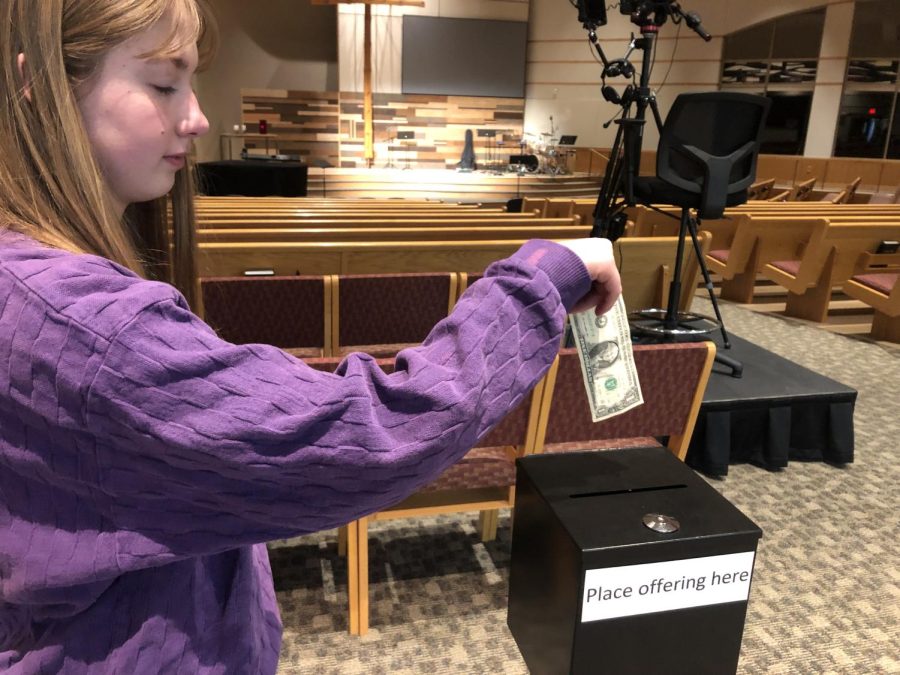Community members support Ukraine
Junior Lydia Mcfarlane at Shepherd of the Valley gives to their Lent offering. Shepherd decided to give all of their Lent offering to a non-profit in Ukraine called Operation Mobilization.
“I think our community just in general, needs to start pushing for more conversation, because I know a lot of people are aware this is happening, but there isn’t a lot of action towards doing anything about it,” sophomore Jane Whitcomb Fossum said about how our community could support Ukraine in their day to day lives.
Over the last few weeks, parts of Ukraine have been destroyed by Russian firepower and military tactics. The Ukrainians have been pushed out of their homes and forced to flee their country. During the last few weeks, many Americans have asked how they can meet Ukraine’s needs and help support them. Some community members have stepped up to fill the Ukrainians needs by raising money, collecting supplies, and many other creative tactics.
An Alina Health clinic in Richfield held a two-week-long supply drive of basic necessities for the people of Ukraine. They collected things like baby wipes, diapers, bar soap, toothbrushes/paste, feminine hygiene products, and more.
“My coworkers and I had been discussing how we really wanted to do something to help people in Ukraine. We were a little unsure of what to do because we wanted to make sure the place we were donating to was legitimate. I had mentioned that someone I knew was collecting donations. People right away expressed an interest in bringing in items to send,” healthcare worker Rachel Nelson said.
Shepherd of the Valley Church decided for this Lent season that they would donate all of the offerings they receive to a non-profit in Ukraine called Operation Mobilization Ukraine.
“So our first offering we took in like $8,000, which is a pretty big amount and what we’ve seen in years past and so I think a lot of people, obviously know what’s happening, and we’re like moved by the crisis,” special needs & serving coordinator Caitlin Ronayne said.
Showing care and support to someone can have a much deeper impact than expected. St. James school in Biddeford, ME. showed their support to Ukraine in a unique way.
“Students in Anna Gervais’ first grade classroom at St. James School cut golden flower petals out of sheets of construction paper on Monday afternoon with tiny, blunt-ended safety scissors. Next, they glued them around brown circles, making sunflowers, Ukraine’s national flower and a symbol of resistance against Russian aggression. Then, they hung each flower in their classroom window, for the world to see,” wrote Troy R. Bennett in the Bangor Daily News.
Some other creative way to support Ukraine is by, “going on Etsy, and making purchases of downloadable art that goes to vendors in Ukraine,” Ronayne said, “It’s just as a way to get money into the hands of like, people there versus through organizations.”
An often overlooked, but important way to show support is by continuing the conversation. Letting the conversation fizz out about what the Ukrainians are going through puts them back to square one. By not putting Ukraine on the backburner, it will show them that they are valued and that they have world wide support.
“Like this is still happening whenever the war ends or wherever this goes from here. They have years and years and years rebuilding. So just remembering it’s easy to respond immediately, but then what happens when they still need help later,” Ronayne said.
Americans all around the world have been touched by the crisis happening in Ukraine. They have stepped up in confidence by showing support locally and globally. It is easy to donate and show support once, then forget, but to see true restoration and change happen in Ukraine, the conversation has only just begun.
Pull Quote- “Like this is still happening whenever the war ends or wherever this goes from here. They have years and years and years rebuilding. So like kind of just like remembering it’s easy to respond immediately, but then what happens when they still need help later,” Ronayne said.

My name is Allie Schlagel, I'm a Layout Editor for the pony express. I'm a junior at Stillwater area Highschool. I play basketball, and French horn, and...



Jeremiah Swartz • May 15, 2022 at 8:03 pm
You did an excellent job of expressing the communities concern for the issue. You did a great job of explaining the efforts of the community. Well done
Ava Stein • May 7, 2022 at 1:48 pm
I like how your story includes ways people can support Ukraine. Your quotes are strong as they show what others are doing to help. Your story has the power to bring people together to help Ukraine.
Charli Burdick-Kitchell • Apr 26, 2022 at 1:49 pm
The message in this article is really thought out and good. I like how the beginning ties very nicely with the end. The article really focused on the humanity around the war instead of just facts which I really appreciated because it can be easy to find the negative facts but hard to bring out the positives.